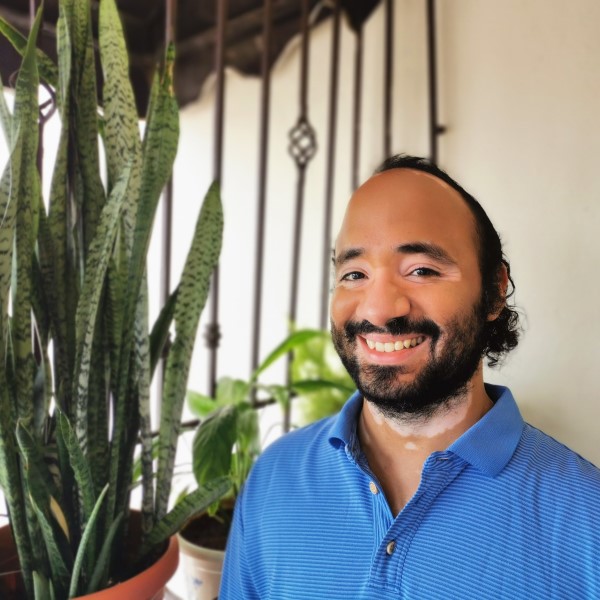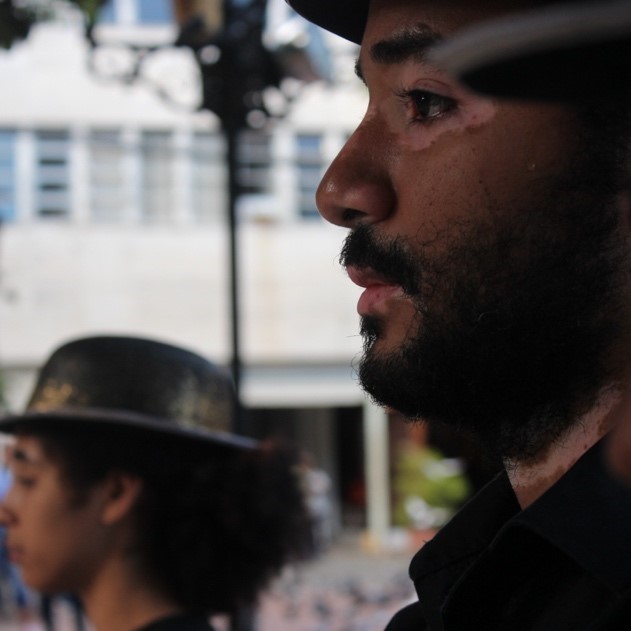Alumni profile - José Bencosme Zayas
(Theatre and Performance MA, 2018)
I dream of creating educational institutions for performance artists in my country. I also dream of better working conditions for my colleagues and future generations. I hope that all the performances and projects I create or participate in, always speak to the audiences as testimonies of our times. Some of these things might take five or ten years… some I might never see. The peak is giving my best for a better arts ecosystem in my immediate reality.

How did you know studying MA, Theatre and Performance at Queen Mary University was the right decision?
When you must decide between several universities that are all very well ranked globally, the decision comes almost subconsciously, and it is very minimal details that make you take a career path. In my case, there were two things that made me decide and understand that Queen Mary was the right decision: the faculty and the city.
On the one hand, I read all the profiles of the professors and researchers that were part of the Queen Mary University Theatre and Performance community, and the most comprehensive, thought-provoking, and inspiring faculty was the one working at Queen Mary University of London at that moment.
The other thing that erased all hesitation from the decision was the possibility of living in London and having access to the many perks that come from being part of the University of London. I always say that the British Library and London’s parks were fundamental in my experience in the United Kingdom.
We are artists and scholars because we are constantly creating and researching. There is an urge, a passion that drives us forward to communicate what we have inside and, through this, respond to the needs of our times.
As a performer and aspiring theatre scholar it was fundamental to have access to the arts scene that happens all around the city. I used to watch almost one play, performance, or event each weekend. This dynamic played a role in understanding the cultural ecosystem of a city as vibrant as London and it was essential in the development of my voice, my critical thinking and the definition of the aesthetics that I wanted to explore as an artist.
What was your most memorable experience during your time at Queen Mary and how did it contribute to shaping your postgraduate experience?
This one is hard because there were many, but I will say that it was the community. I am deeply grateful for my teachers. I want to acknowledge that Jen Harvie, Ella Finer and Catherine Silverstone are the stars in my academic experience. Jen set some high standards of what a researcher and teacher should be, Ella pushed me in the development of my practice towards unknown and fascinating places, and Catherine was the best dissertation supervisor one could ever wish for; inquisitive and kind. I am genuinely honoured and happy to be part of their academic and human lineage. But I also remember Mojisola Adebayo’s voice and rhythm whenever we talked, strolling around the university; Shane Boyle and Dominic Johnson providing support on the research processes from very early on. As well as Maggie Inchley’s insights on cultural production and Daniel Oliver’s encouragement and recommendation on the early development of my practical questions when I was just adapting to the university. And Julia Bardsley’s mind-blowing ideas and feedback on my practical project.
As an international student, what would you say contributed to your ability to easily adapt and integrate into the school environment?
I have not enough words to thank everyone in my cohort. I think that we developed a community of support that helped us thrive in the evolution of the postgraduate year. The ones that were already from the city or had done their bachelor at Queen Mary University were very supportive of the foreigners. We would always eat together on Fridays and talk about the things we experienced during the week both academically and in our personal lives. We really bonded.  Some of these dynamics continued after we all graduated. This last year amid the pandemic, my Performance Lab and Independent Practical Project group have been essential in taking care of the group’s mental health and we have tried to support each other across borders to the best of our possibilities.
Some of these dynamics continued after we all graduated. This last year amid the pandemic, my Performance Lab and Independent Practical Project group have been essential in taking care of the group’s mental health and we have tried to support each other across borders to the best of our possibilities.
I must also acknowledge that outside my department, there were two spaces that were very important and welcoming: the library and St. Bennet’s Chaplaincy, because most of the time you could meet someone, talk openly about many topics or find answers to any type of questions about the institution or the city.
Could you give us an insight into how you apply the skills you learnt during your degree in your current role as an independent performer and creative director in your theatre group and also as a union leader?
Whenever I approach a new project, I do it through questions and I do not know where they will take me, but they are the starting point to everything I do. Therefore, the view of art as research resonated a lot with me. Most of the questions I have now in terms of identity, the Caribbean, the voice, materiality, and the body, come from there. I also started seeing the process more collaboratively and how my voice could connect with a broader audience and community.
Right now, I am leading the creative process of a collective group we created called Teatro Lluvia. The name is Spanish and means something like Theatre (of the) Rain and we start from the metaphor that every drop is unique, but it is the collection of drops that constitute the rain. In this sense, we work like a devised theatre lab exploring the voices and personal stories that we can bring to the rehearsal space to create individual pieces collectively. This is a resource that I started developing before attending Queen Mary, but I incorporated the skills garnered from both the Performance Lab and Independent Practical Project courses.
In this sense, we work like a devised theatre lab exploring the voices and personal stories that we can bring to the rehearsal space to create individual pieces collectively. This is a resource that I started developing before attending Queen Mary, but I incorporated the skills garnered from both the Performance Lab and Independent Practical Project courses.
On the other hand, it is very important for me to always think on the politics and the labour behind all the artistic processes and this is mainly a result of the discussions and critical framework provided in all the courses I enrolled in while at Queen Mary. Consequently, I always try to build spaces for creative exploration in which inclusivity and power dynamics are always questioned and reframed to the best of the group’s ability, not taking them for granted. This is also the reason why when the pandemic hit hard last year, I motivated unionizing and ideas for collective action to the betterment of the working conditions of theatre artists in the Dominican Republic. And we created the Sindicato de Teatristas de la República Dominicana (Dominican Republic’s Theatre Artists Union).
This is still an on-going and long-term process, but I am happy to say that we are doing our best in advocating for reforms in the social security law, started lobbying for the inclusion of labour rights in cultural laws such as a current bill for Dominican Theatre Law, and social outreach for people in general to understand the poor working conditions we have historically had in my country.
From your experience, what do you think is most important for prospective students who are considering studying your course and who want to build a career in your industry?
First, if anyone is considering Theatre and Performance Studies at Queen Mary University of London, they should start by understanding that the programme is designed as a balance between theory and practice. They should have some sort of practical experience in performance or live art because the programme is envisioned to further this practice through critical reflection. In this sense it is deeply personal, and you are working with yourself all the time.
About building a career in the industry, it is very difficult to give a concise answer because the industry is extremely diverse, changes from country to country and has many career paths. Also, people come from many different backgrounds that would make it very pretentious to try to give a one-size-fits-all type of answer.
I will just say that it does not matter where in the world you are, it is a hard industry. Most of the time people will not understand what you are doing as a performance artist or scholar, but when you are passionate about it, constant work always pays off. And please note that I said constant work, not hard work. It is important that we start deromanticizing ‘hustle culture’ to achieve anything in life and that we stay critical to issues we have normalised as good. And I make this remark because whatever path you choose, taking care of yourself is the priority.
Where would you consider to be the peak of your career and when do you envision you will get there?
As someone who has been deconstructing some of these notions, the peak is every day, and it is validated through daily practice. We are artists and scholars because we are constantly creating and researching. There is an urge, a passion that drives us forward to communicate what we have inside and, through this, respond to the needs of our times. This is not to say that I do not have a dream or many dreams of what I would like to achieve. This is to ground myself to build my practice every day.
I can share that I dream of creating educational institutions for performance artists in my country. I also dream of better working conditions for my colleagues and future generations. I hope that all the performances and projects I create or participate in, always speak to the audiences as testimonies of our times. Some of these things might take five or ten years… some I might never see. The peak is giving my best for a better arts ecosystem in my immediate reality.
Finally, what is the most important career lesson you have learnt over time?
The most important career lesson I have learnt over time is that, professionally, you are what you do in your daily life because you can only build a skill if you practice it every day and it is meaningful to you. This is what will make you follow a path for many years and resist even when adversities hit you cold and hard in the face. If I am an artist and researcher, it is because I take some time each day to work on my art or my research.
- Find out more about studying an MA in Theatre and Performance at Queen Mary
- Join the Queen Mary Alumni Network
If you would like to get in touch with Jose or engage them in your work, please contact the Alumni Engagement team at alumni@qmul.ac.uk.